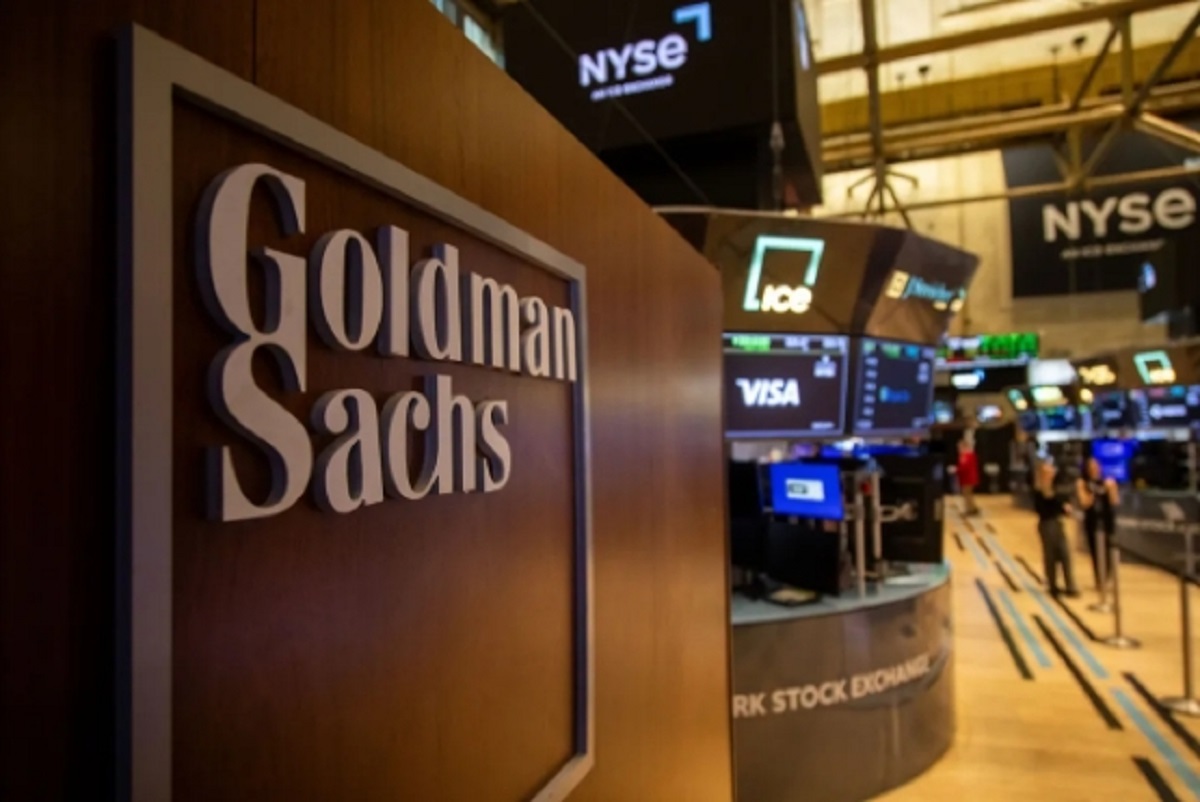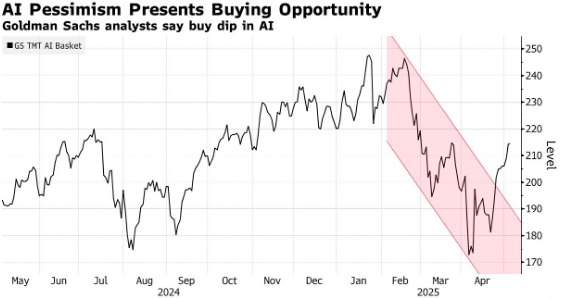Goldman Sachs Spots Buying Opportunity in AI Stocks Amid Sentiment Shift After Earnings Reports
The artificial intelligence sector, once a darling of the stock market, has faced significant headwinds in 2025. A series of challenges, including concerns over the necessity of massive AI investments

The artificial intelligence sector, once a darling of the stock market, has faced significant headwinds in 2025.
A series of challenges, including concerns over the necessity of massive AI investments following China's DeepSeek announcement and fears of an economic slowdown due to Trump's trade policies, have weighed heavily on AI-related stocks. Chipmakers and companies linked to AI technologies saw sharp declines, with Goldman's US TMT AI Basket underperforming the broader market by 19% over the summer and selling off more than 20% in early 2025.
However, a group of analysts at goldman sachs now sees a silver lining in this downturn, identifying a "buy-the-dip"opportunity for investors after better-than-expected earnings from some of the biggest names in tech.

Market Challenges
The AI sector's troubles began in January when DeepSeek raised questions about the billions of dollars pledged to AI development, casting doubt on the long-term viability of such investments. More recently, President Trump's escalating trade war has stoked fears of an economic slowdown, with investors worried that big tech companies might cut back on AI spending. Additionally, the imposition of large tariffs on China has raised concerns about disruptions to supply chains, particularly for chipmakers reliant on global manufacturing networks.
"It is fair to say there is a lot of pessimism in this theme," wrote analysts led by Louis Miller in a note dated May 2. "We consider this an opportunity to buy the dip in AI."
Earnings Reports Shift Sentiment
Despite these challenges, recent earnings reports from tech giants like alphabet inc., microsoft Corp., and meta platforms Inc. have provided a much-needed boost to sentiment. These companies exceeded expectations, showcasing resilience in the face of adversity. Below, we explore their latest results with additional insights woven into each company's performance discussion.
Meta Platforms Inc.
Meta showcased a robust performance in its first-quarter results, posting earnings per share of $6.43, which topped the expected $5.28, alongside revenue of $42.31 billion that beat the forecast of $41.40 billion. Sales climbed 16% year over year, and net income soared 35% to $16.64 billion from $12.37 billion in the prior year, reflecting the company's strong momentum. Looking forward, Meta's finance chief, Susan Li, forecasted second-quarter sales to range between $42.5 billion and $45.5 billion, aligning with analysts’ expectations of $44.03 billion. However, she cautioned that the company is starting to experience reduced ad spend from Asia e-commerce exporters, a potential challenge tied to ongoing trade tensions that could temper this otherwise stellar outlook.
Alphabet Inc.
Alphabet turned in a strong first-quarter showing, with revenue reaching $90.23 billion, surpassing the anticipated $89.12 billion, and earnings per share hitting $2.81, well above the expected $2.01. The company’s search and advertising units drove a 12% year-over-year revenue increase, outpacing Wall Street’s projected 10% growth, even as YouTube advertising revenue slightly missed the mark at $8.93 billion. Overall advertising revenue still rose a solid 8.5% to $66.89 billion, and Alphabet highlighted the expanding reach of its AI tool, AI Overviews, which now boasts 1.5 billion monthly users, up from one billion in October. This growth underscores Alphabet’s ability to harness AI innovation to sustain its upward trajectory despite intensifying competitive pressures.
Microsoft Corp.
Microsoft delivered an impressive first-quarter performance, achieving earnings per share of $3.46, exceeding the expected $3.22, and revenue of $70.07 billion, topping the forecast of $68.42 billion. Revenue grew 13% year over year in the fiscal third quarter, with net income rising 18% to $25.8 billion, fueled by robust demand for its cloud services. The company projected next-quarter revenue between $73.15 billion and $74.25 billion, outstripping the consensus of $72.26 billion, and anticipates Azure cloud service growth of 34% to 35% at constant currency, surpassing the consensus of 31.5%. This strong outlook reinforces Microsoft’s leadership in AI-driven cloud solutions and its capacity to consistently outperform market expectations.
These positive results have helped alleviate some of the market's fears, offering a glimpse of resilience in the AI sector.
Valuation and Performance
Goldman's US TMT AI Basket, which includes companies actively pursuing AI or enabling new technologies, has experienced a rollercoaster ride. After underperforming the broader market by 19% in the summer due to concerns over return on investment, the basket rallied to a high in January. However, it sold off more than 20% in early 2025 following the DeepSeek news and trade war escalations, before partially recovering in the last two weeks.
Despite this volatility, goldman Sachs analysts remain optimistic. "Looking at our Broad AI basket’s performance relative to its earnings, the group continues to be cheap while earnings prove to be steady," Miller said. This suggests that, despite the recent sell-off, the underlying fundamentals of AI-related companies remain strong, making them attractive at current valuations.
Broader Market Sentiment and Economic Outlook
The broader market is also showing signs of improvement, with sentiment shifting as investors begin to "unwind the tariff risk factor,"according to the Goldman Sachs note. Analysts expect upcoming economic data to show minimal impact from tariffs, and they anticipate that U.S. consumers will continue spending until prices increase or unemployment rises—neither of which is expected in the near term. This improving sentiment could provide further support for AI stocks as investors look beyond short-term uncertainties.
In conclusion, while the AI sector has faced significant challenges in 2025, Goldman Sachs analysts believe that recent earnings reports and attractive valuations present a compelling opportunity for investors. As the market begins to stabilize and concerns over tariffs and economic slowdowns ease, AI stocks may be poised for a rebound.
Disclaimer: The views in this article are from the original Creator and do not represent the views or position of Hawk Insight. The content of the article is for reference, communication and learning only, and does not constitute investment advice. If it involves copyright issues, please contact us for deletion.